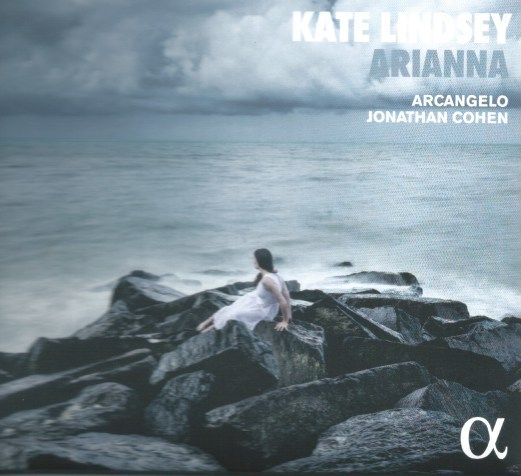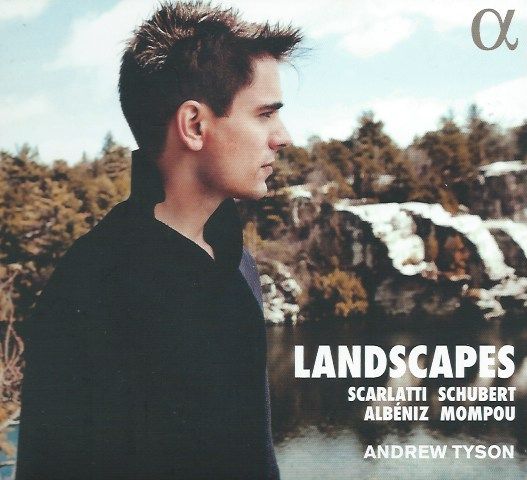Label Focus: Alpha's ferocious curiosity
A look at a label that likes to explore ...

So to begin this week, something new: a look at a relatively new label that has been consistently issuing discs of interest.
Alpha Records is an offshoot of the Franco-Belgian company Outhere Music; it represented a merger of Alpha and Zigzag Territories. Alpha is "committed to ambitious projects of the highest artistic standard that often stray far from the beaten track".
We'll take a selection of a few that stand out that have come my way ...
As a crucible for new talent, Alpha's aim seems to be straight and true. I was very taken with Andrew Tyson's disc Landscapes. The mix of composers - Scarlatti, Mompou, Schubert and Albéniz - is in itself enough to pique interest. Three “pure” Scarlatti Sonatas plus one arranged Tausig pepper the disc, the centrepiece of which is Schubert’s A major Sonata, D664. Tyson finds the idea of responses to Scarlatti branching out into new spaces fascinating, hence the Tausig, while the Scarlatti Sonatas act here as sorbets between courses as well as bookending the recital. The centrepiece, though, is the Schubert Sonata in A, D 664, which Tyson sees as Schubert's first mature masterpiece. From there to the quasi-religious mysticism of Albéniz's Iberia, Book I is quite a way - this is the closest that composer came to Messiaen (Tyson holds the Vingt Régards in his repertoire, so one hopes for a recording in the future).

Into the same bracket comes Saga: a set of mythic tales in song by Loewe, Adolf Jensen, Schubert and Schumann performed by Konstantin Krimmel and Doriana Tchakarova. Taking Lieder with a narative element (and, intelligently, foregoing Schubert's Erlkönig for the gripping tale of Der Zwerg/The Dwarf instead), it's also an exploration of the Ballad form (still song, but more expansive than Lieder). It's intelligent, too, and fully in the manner of Classical Explorer, it eschews the obvious. So when it comes to Erlkönig, we get Carl Loewe's setting, not Schubert's (the entrieaties of the Erlkönig for the child to come dance with him echoed in the text of the preceding song, Loewe's Herr Olaf).
And let's hear Der Zwerg - a song I personally was introduced to via the recording by the great and sorely missed Jessye Norman. First, Krimmel and Tchakarova:
... then - go on, then - that Jessye Norman recording, larger than life as one might expect, with Phillip Moll at the piano:
The Alpha recital also includes the Schumann favourite, Die beiden Grenadieren. Krimmel's strong baritone is compelemented by Doriana Tchakarova's sensitive pianism.
Mezzo Kate Lindsey's name is becoming ever more respected, and her disc Arianna with the excellent Baroque ensemble Arcangelo and their director Jonathan Cohen presents a splendid trio of composers: Alessandro Scarlatti (Domenico's father) and his L'Arianna, Handel's Ah! Crudel, nel pianto mio, HWV 78 and, the best known of the trio, Haydn's Arianna a Naxos. Another disc based on myth, this time the tale of Ariadne that Richard Strauss was - much later - to take as an opera subject. Here's a video of Lindsey recording that Handel; the sheer expressive force is remarkable:
In terms of ensembles, it is a delight to see the Orchestre National de Lille inder Alexandre Bloch here in a typically imaginative programme: Ravel's La Valse and Rapsodie espagnole meet a piece for serpent (a descendent of the cornett and relative of the tuba!: see this Wikipedia link) and orchestra by Benjamin Attahir (born 1987). The serpent's haunting sound can be heard in this, the first movement:
The Orchestre National de Lille gave a most stimulating concert at Cadogan Hall in London in January as part of a nationwide tour: see my review here.
The early music group Le Banquet Céleste under their director, the excellent counter tenor Damien Guillon stands out as one of the label's premiere ensembles. Despite the loveliness of a disc of two Bach Cantatas (BWV 169, "Gott soll allein mein Herz haben" and the famous BW 82, "Ich habe genug"), and in the spirit of exploration, let's highlight two others, both dramatic pieces taken from Biblical stories. First, Stradella's San Giovanni Battista (St John the Baptist), a magnificent piece of writing. Here's Guillon's introduction to San Giovanni:
Then, a disc of Caldara, his Maddalena al Piedi di Cristo (Mary Magdalene at the feet of Christ), surely one of the most consistently beautiful oratorios of all - and one ofthe least known. Try the consummate sadness of "Dormi, O cara," sung by the contralto Benedetta Mazzucato if you buy a copy. Here's another intro:
In the Alpha catalogue, even when there is a more "traditional" aspect, there is usually a slant that illuminates our listening experience. So it is with Claire Chevallier and Jos van Immerseel's disc of piano four hands music by Brahms (one of the most famous Hungarian Dances, No. 1), Grieg Norwegian Dances, Op. 35 and the Op. 46/B 78 Slavonic Dances of Dvorák. Before we go, though, we should mention in passing other delights, which include Esa-Pekka Salonen conducting Beethoven and Richard Strauss, and Paavo Järvi in Messiaen. And on the piano front, fabulous late Beethoven, including a riveting "Hammerklavier," from Filippo Gorini, a name to watch if ever there was one. And there's always Mozart y Mambo, a solo disc by the Berlin Philharmonic horn player Sarah Willis ... the list just goes on ...
